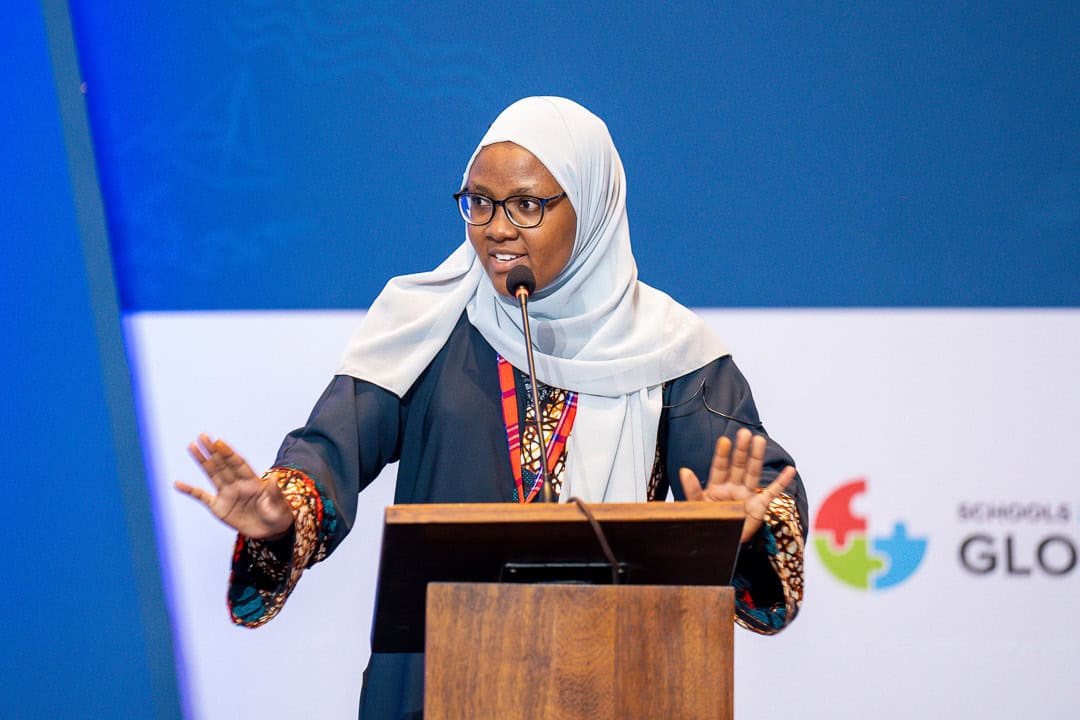This year’s Schools2030 Global Forum in Nairobi was a celebration of teacher leadership, collaboration, and shared purpose. In this interview, Halima Shaaban, Schools2030 National Coordinator, Kenya, looks back on three inspiring days that brought educators, policymakers, and partners together to reimagine what’s possible when teachers lead the way.
The Schools2030 Global Forum is now an established annual event in the education calendar. For those who may not be familiar, could you tell us a little about the purpose of the Global Forum and what makes it unique?
Thank you. The Schools2030 Global Forum is unique in that it brings together a diversity of voices and perspectives on education transformation, with teachers really taking the centre stage. This latest Schools2030 Global Forum in Nairobi was our fourth annual event, and although the themes and formats have changed over the years, what has been constant is the commitment to amplify teacher-led educational change.
Each year, we are joined by teachers and school leaders from across the globe who share their innovations and evidence of “what works” to raise holistic learning outcomes and improve teaching and learning from school to systems level. But it is not just teachers of course, as we know education transformation requires an ecosystem approach. So each Schools2030 Global Forum has a very deliberate and balanced list of delegates to ensure representation from national governments, international organisations, community-based civil society organisations, donors, researchers, youth and of course, educators. And we craft a three-day programme agenda that ensures lots of opportunities for discussion, workshopping and problem solving across these diverse groups – we pride ourselves on a real “action-oriented” event that results in broadly-owned recommendations for the sector.
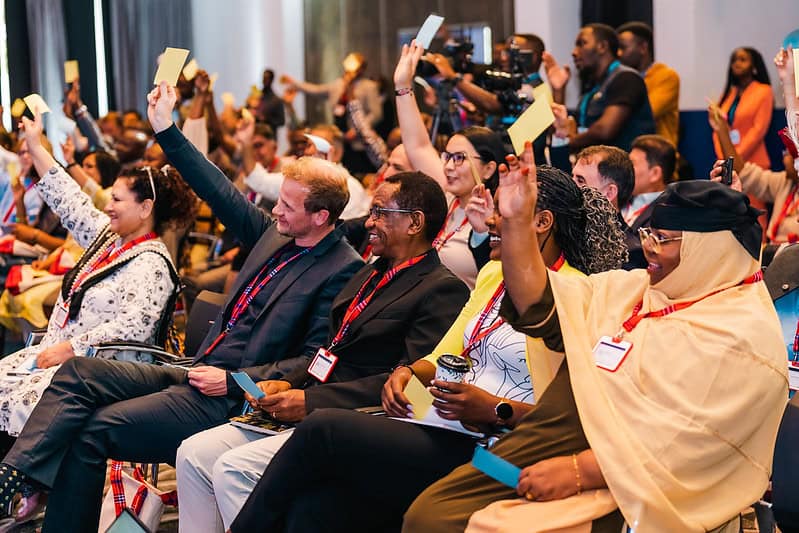
The recent Schools2030 Global Forum in Nairobi brought together educators, policymakers, and partners from around the world. What were some of your standout moments from this year’s gathering?
This year’s edition of the Global Forum was such a rich and multi-layered experience that we’re only now beginning to fully unpack.
One of the most powerful aspects of this year’s gathering was the level of meaningful government engagement. It was encouraging to hear representatives from different countries consistently emphasise the central role of teachers in education transformation. There was a clear call to action around prioritising teachers in policy decisions and strengthening the continuum of teacher support, from pre-service preparation to in-service continuous professional development. This kind of policy alignment is critical if we want to truly empower teachers as leaders and change agents in their classrooms and communities and inform system-level decisions.
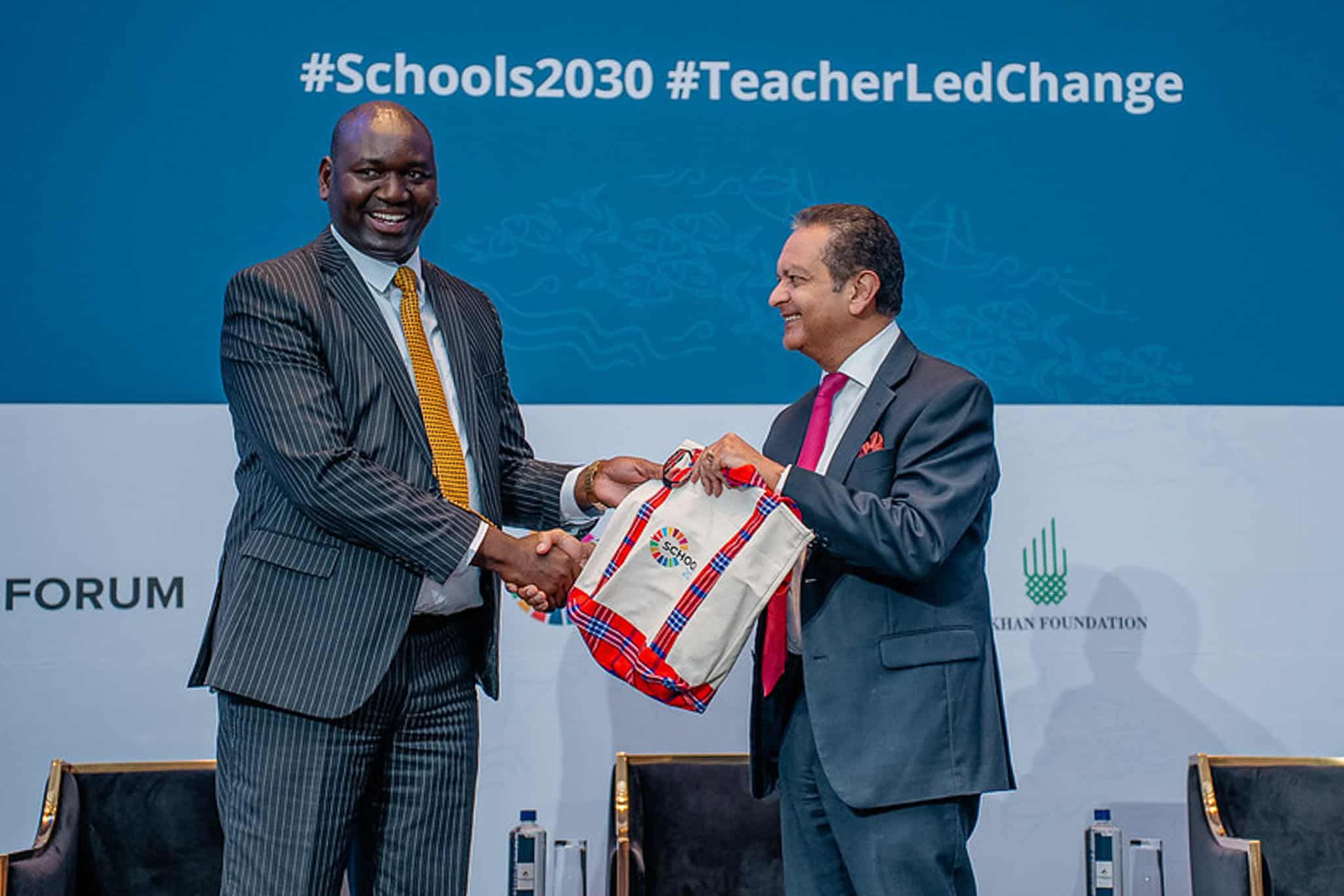
Another standout for me, and arguably the highlight of the entire forum, was the teacher innovation showcase, Walimu Soko (Swahili for Teacher Marketplace). With our ‘passports’ in hand, we were taken on a journey across classrooms from all over the world. It was such a joy to engage with teachers directly, listen to their stories, and witness the creativity and contextual relevance of their innovations. The passion and thoughtfulness with which they shared their work was not only inspiring but profoundly energising.
I was also particularly struck by Grace Cadiz’s (Atlassian Foundation) contribution on the opening panel, especially her reflections on Artificial Intelligence, a topic that is understandably raising concerns among many educators. Her perspective reaffirmed the irreplaceable value of teacher agency and leadership. As Grace highlighted, there are so many essential skills that our young people need, social-emotional learning, empathy, collaboration, and leadership, that technology simply cannot replicate. Teachers nurture and model these every day, and it underscored for me how vital it is that we continue to support them in doing so.
Lastly, the session on activating youth voices, led by our Civil Society partners, was a rich learning moment. It brought to life the voices of the young people whose future we hope to transform. It reminded us that youth agency must be built with the same intentionality we speak of when it comes to teacher agency.
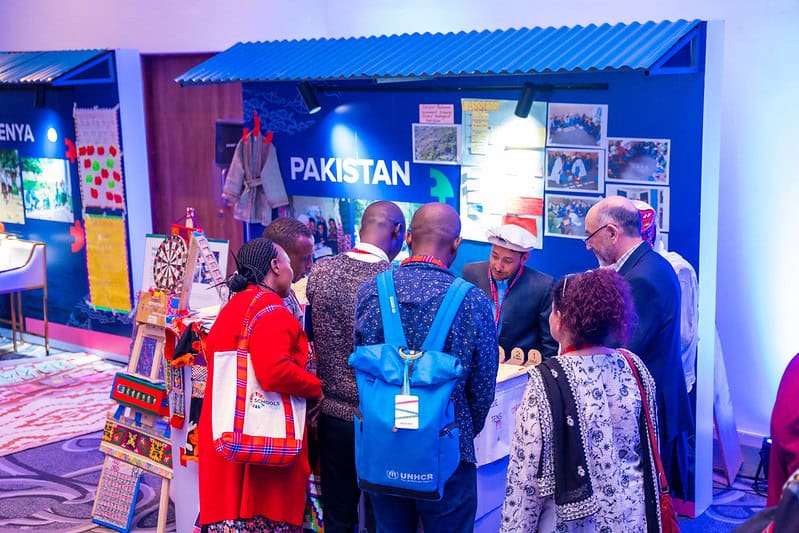
This year’s theme How might Teachers and Schools be the Partners of Choice in solving Complex Learning and Education Challenges? resonated throughout the discussions. Why was this an important focus for the 2025 Forum?
‘Overall, what stood out for me was how deeply the sessions, discussions, and experiences aligned with the theme: How might Teachers and Schools be the Partners of Choice in Solving Complex Learning and Education Challenges? This was not just a rhetorical question, but a call to action that was brought to life across the three days through lived experiences, authentic dialogue, and shared commitments. We chose to focus on three particular ways that teachers can drive education transformation: as researchers, helping to build evidence on “what works” to improve learning and translating evidence into meaningful change at classroom level: as innovators, responding to the needs of learners and communities in the face of uncertainty and change; and as leaders, providing expertise and recommendations on how to close policy-practice gaps and drive quality, equitable learning for all.
These themes felt so relevant in 2025 as the world faces multiple and compounding crises. We all understand that education is the key to solving global challenges, and together we are now recognising that teachers are the key to solving global education.
From your perspective, what examples did you see at the Forum that demonstrate how teachers and schools are already acting as key partners in educational change?
From my perspective, one of the clearest indicators that teachers and schools are already acting as key partners in educational change was their very presence and active participation throughout the Forum. The fact that teachers were not only in the room but also on stage, leading sessions, contributing to panel discussions, and engaging in critical conversations is in itself a powerful statement about their central role in education transformation. This is not something new, teacher presence has always been at the heart of the Schools2030 Global Forums.
“Ensuring that educators are actively engaged has consistently enriched the experience for all delegates. More importantly, it reflects a core commitment by Schools2030 to recognise teachers not just as participants, but as leaders, innovators, and active agents of education reform.”
The Forum’s theme – How might Teachers and Schools be the Partners of Choice in Solving Complex Learning and Education Challenges? – also placed this recognition front and centre, reinforcing the vital contributions teachers are already making.
Bringing the focus to this year’s forum, the Walimu Soko teacher innovation showcase was a standout example. It wasn’t just an exhibition of innovations, it was a vibrant, interactive space that brought teacher-led innovation to life. Teachers from around the Schools2030 countries shared solutions they had co-created to tackle challenges in literacy, numeracy, science, communication, empathy, and beyond. These innovations were rooted in evidence and deeply informed by the lived realities of their learners, demonstrating how teachers are driving context-specific, impactful change every day.
Equally powerful were the panel discussions where teachers contributed as thought leaders. They shared rich insights and real-life examples from their classrooms: what’s working, what’s challenging, and what support is needed to sustain progress. Their voices added depth and authenticity to the conversations, reminding us that any policy, innovation, or reform effort must be grounded in classroom realities to be meaningful and effective.
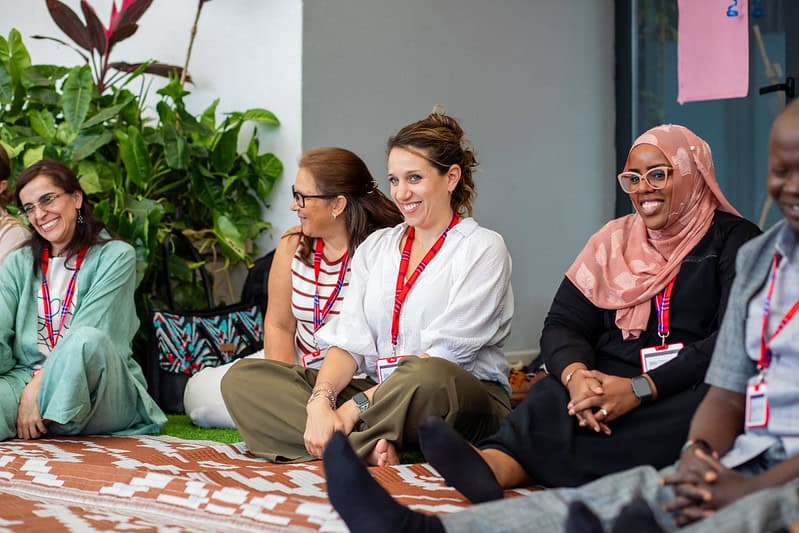
The Forum brings together diverse voices and experiences from across the Schools2030 network. What were some of the key insights or innovations that emerged this year, particularly from the participating teachers?
First off, kudos to all the teachers and country teams who generously shared their insights, experiences, and innovations, it was both humbling and energising to be a part of. The diversity of voices across the Schools2030 movement was a powerful reminder of the richness that comes when educators are trusted to lead with context and care.
What truly stood out to me at this year’s Global Forum was the incredible creativity and innovation demonstrated by the participating teachers. One of the key insights that emerged for me on this was the shared challenge around mathematics and numeracy.
“It was striking to see how this theme cut across several countries, yet the solutions teachers developed were uniquely tailored to their local contexts.”
In Kenya, for example, a teacher transformed abstract mathematical concepts into concrete, engaging experiences using math models and peer learning. In Afghanistan, collaborative group work and problem-solving activities brought new energy into numeracy lessons. India’s contribution was particularly creative, an interactive game built around rhyming songs that taught concepts such as group formation, number sense, and place value. In Kyrgyzstan, teachers encouraged students to explore mathematical ideas by analysing patterns and solving real-world problems through teamwork (and the models presented by the teacher were both colourful and culturally representative). And in Pakistan, a teacher from a remote mountainous village in Chitral designed mathematical games that brought genuine joy into the classroom, games that I and other delegates eagerly joined in playing, proving that learning math can indeed be fun!
To me, this beautifully illustrates a core strength of Schools2030: while many of the challenges teachers face are universal, the solutions are deeply contextual and locally driven. What makes the programme unique is how it empowers teachers to respond to their learners’ needs using the resources and realities around them. This approach doesn’t just address educational gaps; it strengthens teacher agency and innovation from the ground up.
Another important insight that emerged was the growing recognition of social-emotional learning and the critical role of parents and caregivers in supporting children’s learning journeys. This message came through strongly across multiple sessions and discussions, with evidence showing that when parents are actively engaged, education interventions become more sustainable and impactful. It reinforced the idea that meaningful education reform is not just about what happens in the classroom, but about building a supportive ecosystem around the learner.
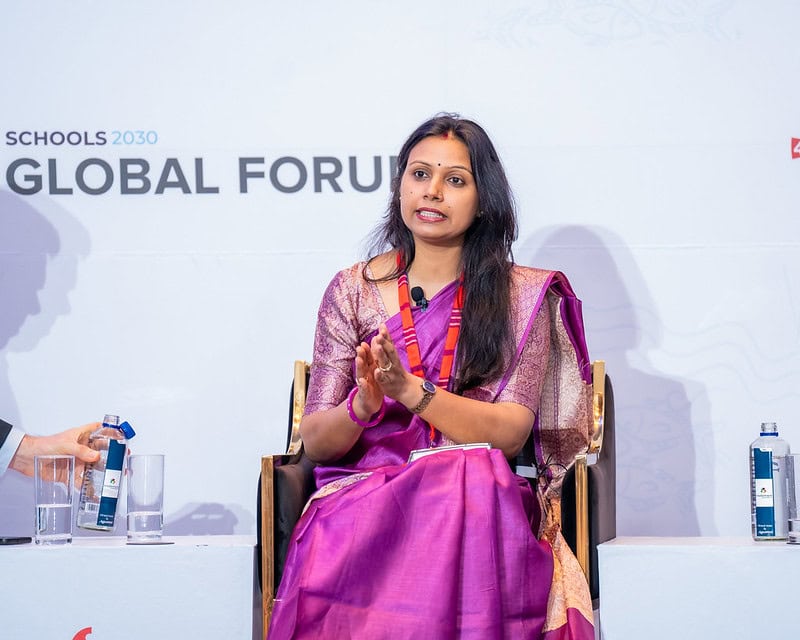
How do you see the connections and learning from the Forum continuing to influence national education systems going forward?
The Global Forum offered more than just inspiration, it reignited important conversations with the Ministry of Education and other key stakeholders about the centrality of teacher agency and leadership in transforming education systems. One of the most encouraging indications of this was the Ministry’s commitment to integrating holistic learning and design thinking into teacher professional development, starting from pre-service training and extending through in-service learning. This aligns powerfully with what the Forum demonstrated: that teachers thrive when they are supported with the right tools, mindsets, and continuous opportunities to innovate.
The practical strategies and classroom innovations shared throughout the Forum gave life to these ideas in a way that was both relatable and actionable. What we now have is a timely opportunity to carry these insights beyond the Forum and begin embedding them within the structures that shape our education system, particularly through Teacher Training Colleges and professional learning pathways that nurture teacher leadership over time.
The momentum built at the Forum doesn’t end at the event. It continues through joint action, follow-up collaborations, and a growing cross-sector commitment to positioning teachers and schools as key partners in solving education challenges. This is crucial for building systems that are responsive, inclusive, and grounded in local realities.
Looking ahead to 2026, a catalyst year, we are at a critical moment to support teacher leadership and agency at scale. It’s an invitation to shift from isolated innovation to system-wide change, and from spotlighting promising ideas to embedding them deeply within our education systems. The Forum helped set the pace. Now, it’s up to all of us to keep the momentum going!
